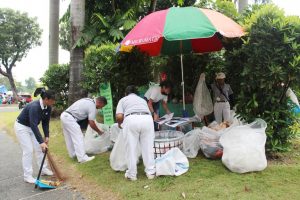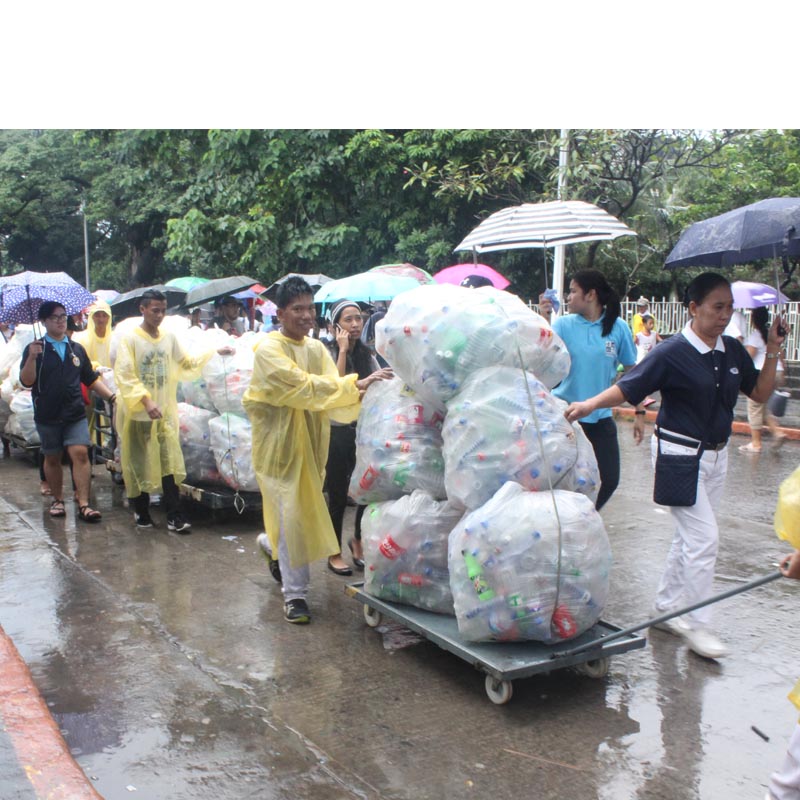
Three years ago, it took almost ten trucks to haul off the waste generated from Nov. 1 to 2 in Manila Memorial Park in Holy Cross, Novaliches. Back then, the park management’s solution was to discard everything.
“Regardless if it’s recyclable or not, they are already considered waste materials,” park manager Jo Seuzo Alo says.
In 2005, Tzu Chi Foundation, a Buddhist charity group and a firm advocate of environmental protection, formed ties with the Manila Memorial Park. Since then, Tzu Chi’s volunteers have been conducting recycling promotion and teaching park visitors proper waste segregation every Undas.
The result has been positive. “The fact is this place has become cleaner because many volunteers are roaming around the Holy Cross Memorial to collect recyclables,” says Alo.
In almost the same way, Himlayang Pilipino Memorial Park in Quezon City used to generate seven truckloads of garbage every year, until Tzu Chi volunteers brought its recycling project there in 2016. Today, Himlayang Pilipino’s waste has been reduced to four truckloads.
It can be said that part of the campaign’s success has been the Tzu Chi volunteers’ relentless promotion and information drives among park visitors.
Three weeks prior to Undas, Tzu Chi volunteers prepare for the activity by making posters, handicrafts and mobile displays out of recycled materials to decorate their booths in the cemeteries. Being able to attract the attention of passersby is an opportunity to present them with current environmental issues and what steps one can take to make a difference.
A September 2017 report by the international nongovernment environmental organization Greenpeace reported that the Philippines is the third worst ocean polluter after China and Indonesia. This is the result of the Philippines’ “sachet economy,” which patronizes products packaged in small, cheap, disposable plastics.
“PET (polyethylene terephthalate) bottles, even if you bury them for 100 years, they don’t easily decompose. So, instead of throwing them away, let’s recycle them so that we will be able to help the needy,” said Libertad Padillo.
Since 2010, Tzu Chi has been working alongside several Metro Manila cemeteries every Undas to ensure cleanliness and promote recycling to the public.
Every year, tons of recyclable materials are collected from these cemeteries. Tzu Chi uses the sales of these recyclables to fund its charity, medical, scholarship and humanistic programs.
“Turn garbage into gold and gold into loving hearts! We can help more people with the missions of Tzu Chi Foundation. All the resources that came from the recycling go to our needy fellow Filipinos, like those who are ill,” added Padillo.
Tzu Chi volunteer Michael Siao emphasized the importance of promoting recycling more than the amount of recyclable materials that can be collected. “The goal is for people to remember to segregate their trash and practice recycling,” he said.
Over the years, Tzu Chi has earned the trust and influenced many of the regular cemetery visitors to practice waste segregation and support Tzu Chi’s environmental protection advocacy.
Jollie Mendoza, who frequents Manila South Cemetery every year, says they have been setting aside their empty soda and water bottles for Tzu Chi.
“We want to help so we support Tzu Chi’s recycling program. Even the simplest act of saving plastic bottles for recycling can make a huge impact,” she says.
